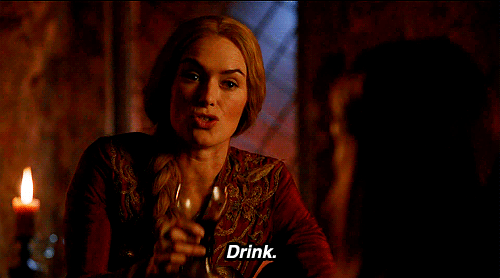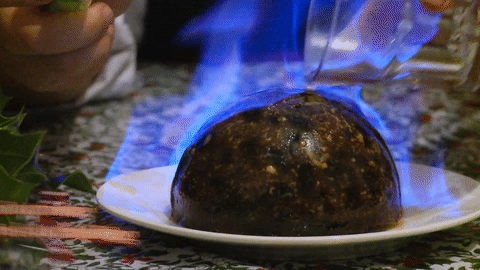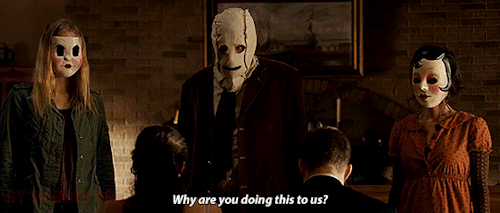Picture it: your family is gathered around the hearth, eggnog in hand, gazing at beautifully wrapped gifts under the tree and each other's festive sweaters. Suddenly, there is a knock at the door. Who could it be? Well, if you live in England, it might well be a bunch of people wearing masks and dancing around on your front lawn. This is Mumming -- a thousand-year-old tradition that started out as a commemoration of the legend of St. George and the dragon. These days, the practice has basically morphed into the actually-just-as-alarming (for completely different reasons) putting on of pantomime, which is so impossible to explain to Americans, I'm not even going to try and get into it.
Wassailing

While the word "wassail" technically means "be well," the English practice -- which dates back to the 15th century -- generally involves people knocking on your door (again), usually on the twelfth day of Christmas, or on New Year's Day, and making you drink an alcoholic beverage (probably mulled wine or something with seasonal spices) from something called a "loving cup". Clearly, they didn't have roofies when this thing started...
The Mari Lwyd
Think mumming and wassailing sound intrusive? Well, it pales in comparison to what the Welsh do to each other. In Wales, if there's a knock at your door in December, it might be a group of men eerily singing a traditional song alongside -- brace yourself -- the elaborately decorated skull of a dead horse, mounted on a stick and -- stay with me -- worn as a costume. And guess what? Not only are you expected to open the door to this horrifying scene, you are also expected to sing back at them and THEN INVITE THEM ALL INSIDE. Sounds too preposterous to be true, right? Well, here's a video of this actually happening to someone. Viewer discretion advised.
In modern times, rather than landing on your doorstep, the Mari Lwyd is more likely to show up in Welsh people's other place of sanctuary: the pub. If you've ever wanted to see an entire room of people singing at the decorated effigy of a dead horse, this one's definitely for you:
The Peter Pan Swim

Open bodies of water in cold climates are basically naturally occurring torture devices. So what better way to make yourself sick for the entire holiday period than by jumping in a freezing lake on Christmas Day? Peter Pan author J. M. Barrie started the tradition in 1864, when he presented a swimming race in London's Hyde Park that still takes place annually. Not to be outdone, similar events now also happen on the English, Welsh, and Scottish coasts. English authorities have been trying to stop the swim on Brighton Beach for years, while Wales has turned the Porthcawl dip into a charity fundraising event. Scotland's equivalent -- called the "Loony Dook" -- takes place on New Year's Day. It should be noted that, just to make the entire thing even harder to watch, all of these events typically involve wearing costumes. Hurray?
Flaming Christmas Puddings

Nothing says Happy Holidays like setting fire to your food at the dinner table, which is what happens in the vast majority of British households every December 25th. Believe it or not, having a flaming Christmas pudding after your meal is such standard practice in the UK, no one even second guesses it. That's not all; if your family is lucky enough to survive the brandy-fueled fire at the table, you then have to contend with the fact that the "dessert" (it's a spiced and boiled fruit cake -- yum?) contains a choking hazard in the form of a coin (sometimes several). Fun for the entire family!
Fireball Swinging
Not content with being in close proximity to a dangerous amount of fire at the Christmas dinner table, the Scots of Stonehaven like to take to the streets every New Year's Eve to throw around massive balls of fire. Legend has it, this extraordinarily dangerous tradition started as a means to ward off evil spirits and bestow local fisherman with good luck for the coming year. These days, people are still into it, as the hair-raising video above demonstrates.
Happy Holidays, everyone!






